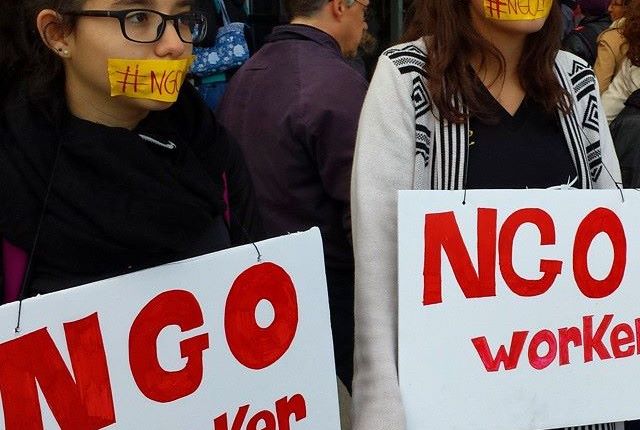Ziad Bahaa-Eldin – Al-Ahram –
It’s perfectly normal for a law to be drafted and tabled by parliamentarians—the constitution states that bills can be submitted to the House by the government or MPs. But what happened with the associations’ law, which the parliament approved in principle last week and sent to the State Council for legal review, is anything but normal.
As the government and civil society were busy discussing drafts for a new law to replace the NGO law in force since 2002, 180 parliamentarians submitted their own bill without warning or even consulting with the government, as confirmed by the minister for parliamentary affairs.
In substance, the new law expresses a view that sees civil society as nothing but a threat to security and stability, a spearhead for foreign interference, and a channel for Egyptians to voice views opposed to the government. It shows no awareness that civil society is a fundamental building block of contemporary society, playing a vital role in economic and social development.
This isn’t a new view. It dominated the NGO scene in previous years and was demonstrated in recent legal amendments and the accusations that have dogged prominent civic actors. But even in these circumstances, dialogue on a new NGO law has continued, and there have always been those in the halls of government that appreciated the importance of civil society. There was therefore a chance, even if slight, for a balanced law that preserved national security as well as the freedom to engage in civic work. The new law, however, is a major setback and signals a turn toward the further closure of the public sphere.
Five major features of the law demonstrate this general outlook.
One, although the law states that civic associations can be formed by notification, it does not specify the necessary documentation, leaving this to the implementing regulations (Article 8). In effect, this means that state agencies will be able to use their discretionary power to control the establishment of associations. They will have the power to deny or allow the formation of new NGOs without restriction or review.
Two, the law bars associations from engaging in activities that “fall within the purview of political parties or professional and trade unions, that are of a political nature, or that harm national security, the public order or morals, or public health” (Article 13). Some of these terms are extremely broad and are not well defined in law.
In other words, what NGOs are allowed to do is not clearly specified, and they could inadvertently break the law at any time. Take associations that work on consumer protection or fight price hikes or discrimination. What can they do to ensure that their activities are not political or labor advocacy or harmful to the public order?
Three, the new law maintains the status quo by requiring prior approval for the receipt of any foreign funding. But now instead of filing for approval with the Ministry of Social Solidarity, associations must seek approval from a new body created by the law, the National Agency for the Regulation of Foreign Non-Governmental Organizations.
Given the power to regulate all matters related to foreign funding and foreign NGOs, the agency consists of representatives from the Ministries of Defense, Foreign Affairs, Interior, Justice, International Cooperation, and Social Solidarity, as well as General Intelligence, the Central Bank, and the Administrative Control Authority (Article 72).
This conflicts with the powers and prerogatives of the Social Solidarity Ministry, which has jurisdiction over all matters related to civic activity.
Moreover, while previous laws specified that applications for funding were considered approved if no response was forthcoming within a certain period, the new law does the opposite. Any applications that go unanswered for 60 days will now be considered denied (Article 24). This provision is flawed because it encourages non-responsiveness instead of issuing explicit denials.
Four, if restricting foreign funding finds some justification in concerns about national security, the law goes further and for the first time restricts funding collected from Egyptians (Article 23). In fact, it makes it a crime punishable by up to five years imprisonment to receive funds locally from Egyptian donors without prior approval (Article 87). This heralds a radical shift in the associational climate in Egypt and will undermine the effectiveness of all manner of charitable, voluntary, and humanitarian activity, which shouldn’t be held hostage to administrative approval and government permits or threatened with prison time.
Five, to further intimidate those who wish to engage in civic action—and remember we’re talking here about charitable and volunteer activity—the law includes another unprecedented provision: all members of the board of any civic association are now subject to the illicit gains law (Article 15). This law was adopted in the 1960s to enable the state to fight government corruption. It shouldn’t be extended to civil society, especially since the law’s constitutionality is questionable because it makes defendants guilty until proven otherwise.
These are just some features of the new law that curtail civil society and volunteerism. I’d imagined that the battle for a new NGO law would be waged by advocates of freedom and justice against the government and its executive agencies, and that the advocates of liberty might find support for their efforts to protect the constitution and freedoms in the parliament. But it turns out the parliament is more royalist than the king.
My hope, nevertheless, is that it’s not too late. I hope parliamentarians, who care about the country’s welfare, will reconsider once the law is sent back to them for final approval, refusing to abandon a constitution that is the best thing we’ve produced in the last five years.
The writer holds a PhD in financial law from the London School of Economics. He is former deputy prime minister, former chairman of the Egyptian Financial Supervisory Authority and former chairman of the General Authority for Investment.
A version of this article was published in Arabic in El-Shorouq newspaper on Monday, 21 November.
____________________
http://english.ahram.org.eg/NewsContentP/4/250637/Opinion/-The-setback-of-the-NGO-law.aspx






